On 10 July the Battle of Britain began, the coordinated effort by the Luftwaffe to overcome the Royal Air Force and achieve air superiority over Britain prior to an invasion. The first phase ran from 10 July to 11 August and was known as the “Channel Battles”, a series of running fights over convoys in the English Channel, intended to give the German pilots training and probe the British defences. British losses in the early weeks were heavy, as the RAF struggled to mobilise fighters in sufficient numbers to fend off the attacks.
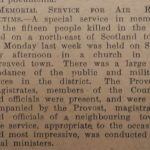 In Caithness, a memorial service was held on Sunday for the 15 victims of the air raid the previous week. As the John o’Groat Journal reported, “There was a large attendance of the public and military forces in the district,” and the Provost, magistrates, members and officials from both Wick and Thurso attended.
In Caithness, a memorial service was held on Sunday for the 15 victims of the air raid the previous week. As the John o’Groat Journal reported, “There was a large attendance of the public and military forces in the district,” and the Provost, magistrates, members and officials from both Wick and Thurso attended.
The Director of Education wrote on 9 July to a correspondent in Edinburgh who was thinking 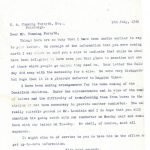 of visiting, and warned him of the risk from air raids: “this place is meantime not one of those which people go unless they need to.”
of visiting, and warned him of the risk from air raids: “this place is meantime not one of those which people go unless they need to.”
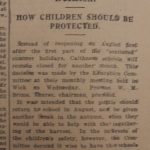 Also this week, the Education Committee considered a suggestion that schools, such as the new school at Lybter, should act as emergency, or “shadow” hospitals. The committee unanimously decided that Lybster School should be left alone “in the interests of the education of the school children”, and that Langwell Lodge, Berriedale, would do instead. Meanwhile, owing to the air raids and the expectation of an imminent invasion of the country they decided to keep the schools closed for another month and not reopen them on 1 August as originally planned.
Also this week, the Education Committee considered a suggestion that schools, such as the new school at Lybter, should act as emergency, or “shadow” hospitals. The committee unanimously decided that Lybster School should be left alone “in the interests of the education of the school children”, and that Langwell Lodge, Berriedale, would do instead. Meanwhile, owing to the air raids and the expectation of an imminent invasion of the country they decided to keep the schools closed for another month and not reopen them on 1 August as originally planned.
The Local Defence Volunteers were also readying themselves for a German invasion. On 13 July D. Keith Murray,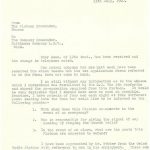 Thurso Platoon Commander, wrote a letter asking for clarification on what to do if the enemy landed: “Who is responsible for giving the signal of any landing by ringing the church bells? In the event of an alarm, what are the posts this Platoon are expected to defend?” And pointing out that although they had received 15 additional rifles, they hadn’t had any extra ammunition.
Thurso Platoon Commander, wrote a letter asking for clarification on what to do if the enemy landed: “Who is responsible for giving the signal of any landing by ringing the church bells? In the event of an alarm, what are the posts this Platoon are expected to defend?” And pointing out that although they had received 15 additional rifles, they hadn’t had any extra ammunition.
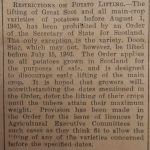 Finally, anyone who feels that Government nowadays interferes too much in our lives should spare a thought for farmers in 1940. As the John o’Groat Journal reported, “The lifting of Great Scot and all main-crop varieties of potatoes before August 1, 1940, has been prohibited by an Order of the Secretary of State for Scotland”. At a time when food was scarce, every potato had to play its part in the war effort and achieve its “maximum weight”!
Finally, anyone who feels that Government nowadays interferes too much in our lives should spare a thought for farmers in 1940. As the John o’Groat Journal reported, “The lifting of Great Scot and all main-crop varieties of potatoes before August 1, 1940, has been prohibited by an Order of the Secretary of State for Scotland”. At a time when food was scarce, every potato had to play its part in the war effort and achieve its “maximum weight”!
